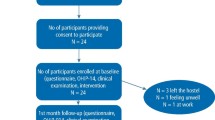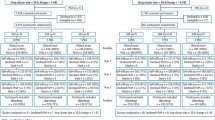Abstract
Design
A randomised controlled trial (RCT) was conducted in a university periodontology clinic.
Intervention
Patients were randomly assigned to a control or an experimental treatment group. For the control, patients received the standard treatment based on instruction about proper prophylactic dental care. For the experimental treatment, patients received information about the symptoms of periodontitis, the causes, consequences and temporal course, and types of effective treatment strategy. The experimental treatment group were also asked to keep daily records of the effects of applying prophylactic dental care on their periodontitis symptoms. A self-reported questionnaire assessed the progress of periodontitis in all patients.
Outcome measure
Plaque indices (PI) were calculated prior to treatment and at a 1-month follow-up.
Results
A total of 33 individuals were recruited, of whom 30 completed the study, 15 in each group. Both groups improved from baseline (mean PI, 1.73; standard deviation (SD), 0.08) to the 1-month follow-up. Smaller PI were observed in the experimental group (mean, 0.24; SD, 0.14) than in the control group (mean, 0.88; SD, 0.38) at follow-up. Post hoc analyses showed that this pattern applied to the proximal and lingual PI but not to the vestibular PI. No differences were found in responses to all questionnaire items between groups.
Conclusions
These data showed that the behavioural education intervention, based on information and training about prophylactic techniques, is more effective than a classical intervention and that it is effective in improving most patients' PI to normal levels.
Similar content being viewed by others
Commentary
The prevention of periodontal disease and dental caries is a major concern of UK and other policy makers, dental professionals and patients. This paper describes a study that evaluated the effects of routine instruction in prophylactic dental care compared with an intervention based on psychological theory, which included both educational and behavioural elements. The study results suggest that an intervention which incorporates dimensions from self-regulation theory and which focuses on increasing self-efficacy (from social cognitive theory) is more effective in improving patients' PI to normal levels than is routine instruction.
This study addresses an issue long known in psychology, which simply giving instructions or increasing knowledge are not sufficient to change behaviour. There must be some question over whether this specific intervention could be viable in general dental practice, however. This RCT took place within one university periodontology consultation service and participants in the experimental group were required to keep and to discuss a diary with an experimenter in a follow-up appointment. Psychological research in other areas of dentistry and clinical practice have demonstrated, nevertheless, that there are many ways to increase self-efficacy; numerous other psychological theories may also be drawn upon to design interventions that require less resource-intensive methodology and still successfully influence behaviour.
These researchers have contributed to the growing number of studies that rightly utilise psychological theory to elucidate what is a psychological issue — changing behaviour. Repeat studies are still required in the future; these should also have increased participation rates, apply the techniques to other behaviours, and consider the practical aspects of interventions in terms of how they could be implemented at a service-level. If the reliability and generalisability of these results are established, the application of psychological theory in dentistry should increase the quality of dental care and outcomes.
Author information
Authors and Affiliations
Additional information
Address for correspondence: Pierre Philippot, Department of Psychology, University of Louvain, 10 place Cardinal Mercier, Louvain-la-Neuve B-1348, Belgium. E-mail: pierre.philippot@psp.ucl.ac.be
Philippot P, Lenoir N, D'Hoore W, Bercy P. Improving patients' compliance with the treatment of periodontitis: a controlled study of behavioural intervention. J Clin Periodontol 2005; 32:653–658
Rights and permissions
About this article
Cite this article
Bonetti, D. Behavioural educational intervention can improve patients' compliance with prophylaxis. Evid Based Dent 7, 11 (2006). https://doi.org/10.1038/sj.ebd.6400370
Published:
Issue Date:
DOI: https://doi.org/10.1038/sj.ebd.6400370



